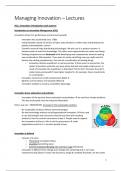College aantekeningen
Managing Innovation (MAN-BKV39)- Lectures RU
- Instelling
- Radboud Universiteit Nijmegen (RU)
All lectures of elective Managing Innovation. Contains images and tables from the book 'Innovation Management and New Product Development' of P. Trott (2021). Keuzevak FdM Radboud Universiteit
[Meer zien]





